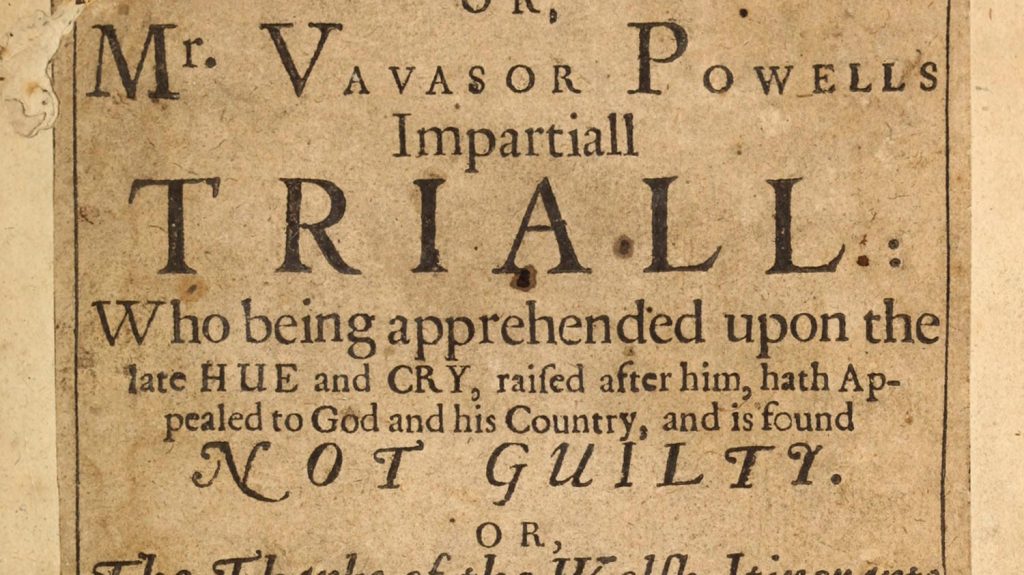Vavasor Powell, the Welsh Puritan preacher, died today in 1670. Originally a deacon in the Church of England, Powell threw off ‘the habit of a foolish shepherd’ and became a courageous dissenting evangelist, attracting large crowds, thuggish hecklers, and legal problems (above) as he preached in the churches and chapels, fairs, markets and mountains of Wales. Although he was a republican, he was accused of political disloyalty in the time of Cromwell, and then suspected of sedition in the time of King Charles II, for which he spent most of the final decade of his life in prison. He died in London’s Fleet Prison and was buried in Bunhill Fields, a large crowd of dissenters accompanying him to his grave.
Brahmabandhav Upadhyay, the Bengali theologian, journalist and advocate for the indepndence of India from British rule, died today in 1907 at the age of 46 while he was prison in Kolkata, during his trial for sedition. Born into a Brahmin family, he became first an Anglican and then a Catholic in his early 30s, and described himself as a Hindu Catholic theologian. He brilliantly anticipated many of the debates later in the 20th century about the cultural captivity of Christianity and the need for genuinely non-Western expressions of the faith.
‘The religion of Christ will never be appreciated by the Hindus if it be not divested of its Graeco-European clothing. It should be restated in terms of Vedanta before it can be properly intelligible to the Hindy mind.’ Brahmabandhav Upadhyay, 1900
Tonight in the year 312 was one of the most fateful in Christian history. On the eve of the Battle of the Milvian Bridge, Constantine, who was then one of the four rulers of the Roman Empire, had a vision of a cross in the sun, and was told to fight under this sign. With the cross marked on his banners, Constantine won the battle against his rival, Maxentius, and went on to become the first Roman Emperor to embrace Christianity. The change from sect to state religion must be the greatest transformation the Church has undergone since it opened up to Gentiles in the Book of Acts.
Frumentius, the 4th century missionary who brought the Christian faith to the Kingdom of Axum (in what is now northern Ethiopia and Eritrea), has his feast day today. His family was from Tyre, but when he was a boy, he and his brother were captured during a sea voyage and taken as slaves to Axum. They found favour with the King, and Frumentius started to spread the message of Jesus in the Kingdom. Eventually Frumentius travelled to Alexandria to ask St Anthanasius to send a Bishop to Axum to continue the evangelistic work he had been doing there, and Athanasius chose Frumentius himself.
Michael Servetus was executed in Geneva today in 1553 for the heresy of denying the Trinity. He had already been condemned to death by the Catholic Inquisition in Vienne, France, partly thanks to accusatory letters sent by John Calvin, leader of the Reformation in Geneva, who had crossed swords with Servetus before. Servetus escaped from prison in Vienne and inexplicably showed up in Geneva, where he was was arrested after hearing Calvin preach. Calvin was keen to show that he was as fiercely orthodox as the Catholics, but asked for Servetus to be beheaded on compassionate grounds. This was refused, and so Servetus was burned as a heretic.
Today is the feast day of St Procla, the wife of Pontius Pilate, in the Greek Orthodox Church. Procla has only a brief moment in the Gospel of Matthew, where she sends a message to Pilate as he is judging Jesus, saying, ‘Don’t have anything to do with that innocent man, for I have suffered a great deal today in a dream because of him.’ While the Eastern Church made her a saint, Western theologians such as Martin Luther regarded her message to Pilate as an attempt by the Devil to sabotage the plan of salvation.
Image: Princeton Theological Seminary Library/Internet Archive
